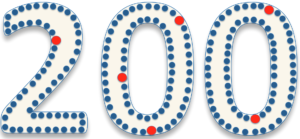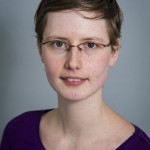6 out of 200: Codewords for a better communication
BLOG: Heidelberg Laureate Forum


Meet Relinde Jurrius in this Q&A series with 6 out of 200 mathematicians or computer scientists participating at the 2nd Heidelberg Laureate Forum, September 21-26, 2014. 24 Laureates (Abel Prize, Fields Medal, Nevanlinna Prize, Turing Award) will attend the forum together with them. For a full week Heidelberg in Germany will be the hot spot of mathematics and computer science.

Name?
Relinde Jurrius
Nationality? Dutch
Where are you based? I have just moved to the postcard with mountains and a lake that is Neuchâtel, Switzerland.
What is your current position? Since September 1st I work at the University of Neuchâtel as Maître-Assistant: I will do research and I will also be the main lecturer of several courses.
What is the focus of your research? My research interests are in coding theory, network coding, and the connection with other branches of mathematics such as matroid theory, algebraic and finite geometry, and combinatorics.
Coding theory is the answer to the problem of noise in digital communication. Digital communication is everywhere around us in modern society: it is used by mobile phones, CD’s, computers, the Internet, wireless networks, QR-codes, GPS signals, etcetera. The messages of this communication are sequences of zeros and ones. Unfortunately, digital communication is not error free: there can be a scratch on a CD, the GSM signal can be disrupted by atmospheric disturbances, magnets influence the data stored on a hard disk. This results in some zeros changed to ones, or the other way around. This noise can make a message unreadable by the receiver.
The idea behind coding theory is to add some redundant information to a digital message. If part of the message gets changed or lost during communication, there will still be enough information left to reconstruct the message. Compare this to human language: not every sequence of letters forms a word. Therefore, if a spelling mistake or typo is made, the reader can often still understand the meaning of a word. So an error-correcting code is a set of “codewords”, where the words are vectors over a finite field (often the binary field, giving vectors of zeros and ones). The more the codewords “look different”, the better the code is at correcting errors.
Nowadays, a lot of digital communication is not transmitted through a single channel, but through a network of channels: for example a wireless network on campus, or the Internet. This requires new methods for error correction, studied by the new field of network coding. The codes used in network coding have their own way for codewords to “look different”.
Why did you become a mathematician? According to my parents, I have wanted to be a professor in mathematics since I was ten years old. Although I cannot remember this in detail, it is a fact that my interest for mathematics goes long back. It was my favorite subject in school, and at age of 14 I visited my first math summer camp with Vierkant voor Wiskunde. It became an annual tradition. Spending the summer learning about Euclidian geometry, Fibonacci numbers, cryptography and the concept of a mathematical proof, was a great motivation to study mathematics after high school.
The reason I prefer being a mathematician in academia is that it gives me the opportunity to share my knowledge with others. When I discover exciting new mathematics, I like to write a paper about it and present it at a conference, so my colleague mathematicians can join in my excitement. For the same reason, I like to keep myself up-to-date with the research of others by reading their papers and attending their talks. I also very much look forward to giving a workshop at the HLF.
My joy in sharing knowledge is not restricted to my own research results, but includes teaching. I like helping students to become better at mathematics, even if it is not their major subject of study. This is also why I still go to math camp every summer, but now as a leader.
Anything like a favourite project? In Europe, the research in network coding is organized via a COST Action. This means the EU gives money to organize conferences, travel, and for other activities that are designed to exchange ideas. The aim is to bring together not only theoretical researchers but also people working in more applied areas. I enjoy being part of this Action: it gives me a platform where I can meet a variety of researchers who do something closely related to what I do. Some of my previous research was not that “fashionable”, so it was not always easy to find the right audience for it.
What about your life beyond research? In general, I like to be very busy, so I do a lot of things besides my work. My main hobby is playing the violin: I started when I was six years old and never stopped. I still take lessons, I try (but often fail) to practice every day, and I like to play with others. In Brussels, I played string trios with two colleagues, every few weeks during our lunch break. In Eindhoven, where I did my PhD, I was in a symphonic orchestra that played big romantic pieces from Mahler, Bruckner, Wagner, Strawinsky, etcetera, in the great concert halls of The Netherlands and abroad. This was awesome (e.g. watch this) and I hope to find something like that again in Switzerland. Tips are welcome!
Because most of the aforementioned activities do not require too much physical activity and/or being outside, I try to compensate that: “mens sana in corpore sano” really works for me. So I walk or cycle everywhere, I like to go running, and I have been told I am very close to ski slopes for the coming winters…
Why did you apply for the HLF14? I was applying for jobs and I thought: “I might as well apply for the HLF, it sounds fun, and I have most of the paperwork already up to date!” I thought this out loud on Facebook, and a friend who is doing a PhD in chemistry replied that I should definitely apply: she had been to a similar meeting, the Lindau Nobel Laureate Meetings, and had enjoyed it very much. So I applied.
What do you expect from this meeting? To meet a lot of interesting people! Given my ambition to become a professor, I expect it to be highly motivational to meet people who have already reached that goal (or at least are closer to it then I am). I look forward to hearing about the choices they made on their way and listen to their opinion on mine. On the other hand, I look forward to the interaction with other young researchers. Developing as a mathematician is not only about mathematics, it is also about balancing your academic ambitions with other personal priorities. In my experience, people with roughly the same age and professional background are very valuable conversation partners to discuss these issues with.
Any Laureates on your list you would definitely love to talk to? I was excited to reed that Manjul Bhargava, who just got a Fields Medal, is coming. In the piece about him in Quanta it says: “Bhargava felt the strongest tug between mathematics and music but decided in the end that it would be easier to be a mathematician who did music on the side than a musician who did mathematics on the side.” This is exactly my point of view!

